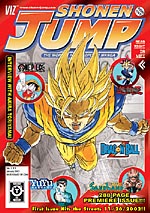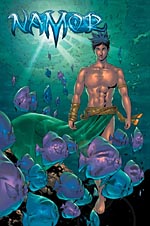>> Top Nine: O'Brien's Choice
>> Article 10: Arts From Their Elbows
More...

A month or so back, I mentioned one of my predictions for 2003. This is the year that manga is going to break through. And by that, I don't mean it'll break into the direct market. I mean it'll break through in its own right into newsstands and bookstores, bypassing the direct market entirely and creating a new, parallel comics market where manga is the mainstream.
Now, I'm not guaranteeing any of this, mind. But it's one of my pet theories for 2003, and I'm keeping an eye out to see how the evidence stacks up for it. The main evidence thus far is the apparently phenomenal sales on SHONEN JUMP, and the absolute dominance of manga in the American bookstore charts, to the virtual exclusion of homegrown comics. Something's going on out there, and it could well be the wholesale outflanking of the direct market.
But what does that mean for American publishers? In some respects, it's great news - it helps to re-establish distribution channels for comics, which they'll then be able to move in and take advantage of. It could simply mean that after years of confinement to the ghetto of the direct market, American publishers will also have the chance to escape and get back into the cultural mainstream again. That's something that many of them have been trying but failing to achieve for years.
 Except the cultural mainstream they could be about to enter may well be one that's primarily interested in manga. SHONEN JUMP is supposed to have achieved sales that dwarf DC's, despite DC being part of a massive multinational and, at least in theory, having access to those sort of resources. Why would that happen? Two obvious reasons suggest themselves. One is that DC has dismally failed to make use of the resources open to it. The other is that SHONEN JUMP is a vastly more desirable product than anything DC has to offer - or, at least, is perceived as such by the distribution channels.
Except the cultural mainstream they could be about to enter may well be one that's primarily interested in manga. SHONEN JUMP is supposed to have achieved sales that dwarf DC's, despite DC being part of a massive multinational and, at least in theory, having access to those sort of resources. Why would that happen? Two obvious reasons suggest themselves. One is that DC has dismally failed to make use of the resources open to it. The other is that SHONEN JUMP is a vastly more desirable product than anything DC has to offer - or, at least, is perceived as such by the distribution channels.
There seems to be a schism between the manga and US comics audiences. The conventional comics readers - from the fanboys through to the chattering classes - still tend to act as if the direct market is the centre of activity. Certain aspects of manga have clearly influenced particular artists (primarily those aspects also associated with anime), but the stories and formats of manga remain alien to the US direct market. Meanwhile, the manga books seem to be drawing a new and quite separate audience. It would be stretching a point to say that it's a mainstream audience - in its way, manga is also a niche market. But it's an audience that the conventional distribution routes seem more interested in dealing with, and that gives them the advantage.
The idea of imported comics dominating the American comics landscape, with domestic publishers marginalised, may seem absurd. After all, surely the domestic publishers are much better placed to produce material tailored to an American readership. But then, they probably said that about Britain once upon a time, and look what happened to us - a handful of kiddie books and humour comics, plus 2000AD, all drowning under the weekly wave of American imports. Even Com-X tailors its comics to appeal to US-dominated tastes. There's no good reason why it couldn't happen in the USA.
The question is whether manga is bringing in a whole new audience who will be interested in comics in general - which would be good news for everyone - or whether it's just identified an audience of manga fans who'll never cross over to other comics. On that point, it's too early to tell. As of yet they're not showing much interest beyond manga, but that might just mean that they're in a transitional phase.
'There seems to be a schism between the manga and US comics audiences.' The argument that they're bound to cross over in the end runs something like this. Manga isn't a genre, it's just a catch-all term for all Japanese comics. They're extremely diverse. It simply wouldn't make sense for readers to be interested exclusively in Japanese comics, and not in the equivalent stories in the same genres from other countries. Surely a reader of manga must be, at least potentially, a reader of comics in general.
Good argument. Perfectly rational.
But people aren't always rational. After all, by the same logic, you'd expect the existing American comics readers to be interested in foreign comics - and for the most part, they don't seem to be. Of course, that's inevitable for those that are actually superhero genre fans - American comics are the main place you're going to get those. But for those readers whose tastes go wider, they do still seem fairly US-centred.
Then again, they're reading material from their own culture and originating in their own language; the manga audience is reading comics translated from Japanese and originally aimed at an entirely different society. But then, that's part of the appeal of both manga and anime. It's something that US comics are inherently unable to provide. Manga and anime make a virtue of their culturally alien side, at least for the purposes of marketing to English-language audiences. If audiences perceive that to be a significant part of manga's appeal to them, then American comics are going to be a very tough sell.
Still, just because it's tough doesn't mean its impossible. And it was only a matter of time before the major American publishers started considering how they were going to try and take advantage of the new audience that's been created for them. This does not necessarily mean producing manga. It means producing American comics consciously designed to appeal to the American manga audience (who, remember, weren't the primary intended audience for manga to start with).
 Marvel's approach involves the Tsunami launch, which sees six new titles launch in April. In Joe Quesada's brief editorial it seems fairly clear that manga is supposed to figure into this somehow, although it's not always entirely clear how. "Manga is sweeping the country, growing in popularity almost daily with the youth market, and even more importantly, with female readers... Many of our new Marvel Tsunami titles are ripe with manga flavor", he says.
Marvel's approach involves the Tsunami launch, which sees six new titles launch in April. In Joe Quesada's brief editorial it seems fairly clear that manga is supposed to figure into this somehow, although it's not always entirely clear how. "Manga is sweeping the country, growing in popularity almost daily with the youth market, and even more importantly, with female readers... Many of our new Marvel Tsunami titles are ripe with manga flavor", he says.
The comics are a curious bunch. "Some titles", says Quesada, "feature the work of some of Japan's hottest manga creators". That presumably refers to NAMOR, which boasts the mind-bendingly unlikely creative team of Bill Jemas, Andi Watson and Mizuki Sakakibara. This is a solo series for a secondary character with no substantial fanbase; it's got an artist most direct market readers have never heard of; it's co-written by an indie comics writer with little track record in the genre, and, well, Bill Jemas; and it's set in the 1930s. For this title to succeed in the direct market, no matter how good it is, would be little short of astounding. This tells us one of two things - either the folks at Marvel aren't aiming this book primarily at the direct market, or they've completely lost their minds.
What else? There's SENTINEL, a boy-and-his robot book, which is a relatively manga set-up. RUNAWAYS could really be pretty much anything at this stage, although the solicitations suggest some sort of teen drama with superpowers. But the other three don't immediately leap out as being very manga at all. MYSTIQUE, by Brian Vaughan and Jorge Lucas, sounds potentially very good, but doesn't sound remotely manga. VENOM, by Daniel Way and Francisco Herrera? A solo series for the Human Torch?
Maybe things will become clearer when the titles appear. Moreover, though, if these books are seriously aimed at manga audiences, then for all the talk about "new readers" in Previews, those new readers are not going to come through the comics stores. What we're seeing at the moment is Marvel's attempt to spin these series to direct market audiences in an attempt to get a few more sales from that market as well. The real test of these titles' success - by their own criteria - will come when they make it to the manga audiences in the trade paperback format. It'll be interesting to see how Marvel packages them.
Clearly this is an attempt to produce titles that straddle the direct market and manga audiences. The problem is that the audiences are just too different at the moment. I have trouble believing that any comic is likely to achieve significant levels of success with both audiences. Appealing to the manga audience right now requires something very different from direct market material, and the Tsunami books don't appear to be it.
Which is a shame, as some of the new titles sound promising. But there's a high risk that they'll fall between two stools, missing both their target markets and landing in the demographic void between them. It's going to be an interesting experiment to watch; the results may not be quite so pretty.

This article is Ideological Freeware. The author grants permission for its reproduction and redistribution by private individuals on condition that the author and source of the article are clearly shown, no charge is made, and the whole article is reproduced intact, including this notice.


